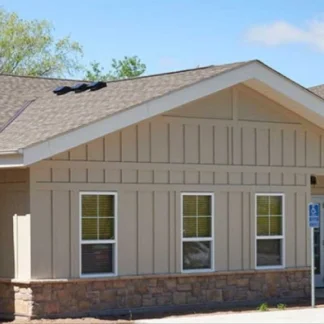Empower Recovery Services
Empower Recovery Services is a private rehab located in Pine City, Minnesota. Em...
Meridian Meadow Creek is a dual diagnosis drug and alcohol rehab center located in Pine City, MN. The facility focuses on providing person centered care to women struggling with substance use disorders.
Meridian Meadow Creek specializes in providing a residential level of care to women. Their continuum of care and addiction treatment services include:
Recognizing the interconnection between mental health and substance use disorders, Meridian Meadow Creek specializes in dual diagnosis treatment, addressing both aspects concurrently for more effective and holistic healing.
The residential treatment program at Meridian Meadow Creek offers a peaceful campus as it sits amongst the fields and forest. During their stay, residents receive individualized treatment plans that include a well rounded balance of individual, group, and family education sessions, social activities, exercise, healthy meals, and alumni support. Plans typically run between 4-6 weeks.
To ensure long term progress and success post-treatment, Meridian Meadow Creek provides thoughtful aftercare planning, equipping individuals with the tools and resources for continued growth and stability.
Contact us for more information: (877) 367-1715

Connect with Meadow Creek by calling their admissions team directly.
(877) 367-1715 Website Get DirectionsThe Substance Abuse and Mental Health Services Administration (SAMHSA) is a branch of the U.S. Department of Health and Human Services. Established in 1992 by congress, SAMHSA's mission is to reduce the impact of substance abuse and mental illness on American's communities.
SAMHSA Listed: Yes
Group therapy is any therapeutic work that happens in a group (not one-on-one). There are a number of different group therapy modalities, including support groups, experiential therapy, psycho-education, and more. Group therapy involves treatment as well as processing interaction between group members.
In individual therapy, a patient meets one-on-one with a trained psychologist or counselor. Therapy is a pivotal part of effective substance abuse treatment, as it often covers root causes of addiction, including challenges faced by the patient in their social, family, and work/school life.
Trauma therapy addresses traumatic incidents from a client's past that are likely affecting their present-day experience. Trauma is often one of the primary triggers and potential causes of addiction, and can stem from child sexual abuse, domestic violence, having a parent with a mental illness, losing one or both parents at a young age, teenage or adult sexual assault, or any number of other factors. The purpose of trauma therapy is to allow a patient to process trauma and move through and past it, with the help of trained and compassionate mental health professionals.
In individual therapy, a patient meets one-on-one with a trained psychologist or counselor. Therapy is a pivotal part of effective substance abuse treatment, as it often covers root causes of addiction, including challenges faced by the patient in their social, family, and work/school life.
Trauma therapy addresses traumatic incidents from a client's past that are likely affecting their present-day experience. Trauma is often one of the primary triggers and potential causes of addiction, and can stem from child sexual abuse, domestic violence, having a parent with a mental illness, losing one or both parents at a young age, teenage or adult sexual assault, or any number of other factors. The purpose of trauma therapy is to allow a patient to process trauma and move through and past it, with the help of trained and compassionate mental health professionals.
Trauma therapy addresses traumatic incidents from a client's past that are likely affecting their present-day experience. Trauma is often one of the primary triggers and potential causes of addiction, and can stem from child sexual abuse, domestic violence, having a parent with a mental illness, losing one or both parents at a young age, teenage or adult sexual assault, or any number of other factors. The purpose of trauma therapy is to allow a patient to process trauma and move through and past it, with the help of trained and compassionate mental health professionals.
Empower Recovery Services is a private rehab located in Pine City, Minnesota. Em...